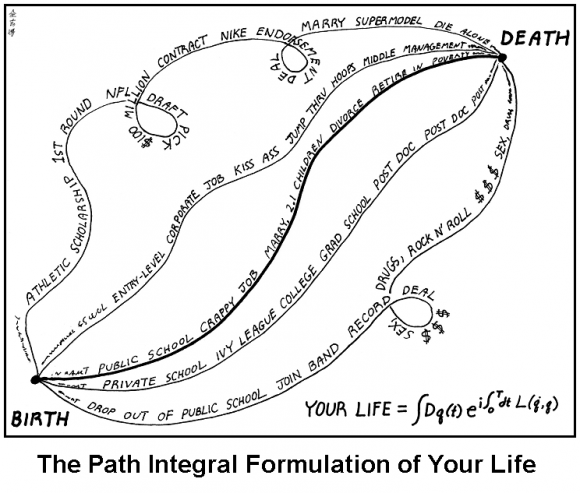
 |
 |
Physics 739, Fall 2012
Advanced Quantum Mechanics I
 |

|
 |

Thirty-one years ago [1949], Dick Feynman told me about his "sum over histories" version of quantum mechanics.
"The electron does anything it likes," he said.
"It just goes in any direction at any speed, forward or backward in time,
however it likes, and then you add up the amplitudes and it gives you the
wave function." I said to him, "You're crazy." But he wasn't.
--Freeman J. Dyson in a statement in 1980, as quoted in Quantum Reality : Beyond the New Physics (1987) by Nick Herbert.
|

|
Lectures: Tues. 10:00-11:30, Thurs. 10:00-11:30 Term I,
Room: ABB/272
Instructor: Dr. D.H.J. O'Dell
Office: ABB 320
Office Hour: Monday 11:00am-12:00pm
Email:
dodell@mcmaster.ca
For the main text book I have chosen:
Modern Quantum Mechanics (Second Edition),
J.J. Sakurai and J. Napolitano, Addison Wesley,
ISBN: 978-0-8053-8291-4
Other reference books:
Topics in Advanced Quantum Mechanics, Barry R. Holstein, Addison Wesley, ISBN 0-201-50820-6
(Note: will soon be republished by Dover at a much cheaper price!)
Principles of Quantum Mechanics,
R. Shankar, Springer,
ISBN: 0-306-44790-8
Quantum Mechanics,
L.E. Ballentine, Prentice Hall,
ISBN: 0-13-747932-8
Lectures on Quantum Mechanics,
G. Baym, Benjamin,
ISBN: 0-805-30667-0
Lectures on Quantum Mechanics,
S. Weinberg, Cambridge, ISBN: 978-1-107-02872-2
Classical Mechanics (Third edition),
H. Goldstein, C. Poole and J. Safko, Addison-Wesley, ISBN: 0201 65702 3
Chaos and Integrability in Nonlinear Dynamics,
Michael Tabor, Wiley, ISBN: 978-0471827283
Introduction to Dynamics, Ian Percival and Derek
Richards, Cambridge University Press, ISBN: 0521 28149 0
|
Course Objectives
This course is the first of the graduate level courses in quantum mechanics offered by the Department of Physics and Astronomy
[Physics 740 (Advanced Quantum Mechanics II) is the second].
I will assume that you have already taken two courses in quantum mechanics at the undergraduate level,
so that you are familiar with the motivation and underlying concepts.
Topics we will cover include: Heisenberg, Schroedinger, and interaction pictures, Feynman path integral approach, time-independent
and time-dependent perturbation theory,
the quantum theory of angular momentum, and symmetry.
The text book contains more material than can be covered in a single semester. Some of the later chapters,
such as identical particles and scattering theory will be left to
Physics 740. The rest will be covered by a combination of lectures and assigned reading.
Students from outside the Department of Physics and Astronomy are welcome to take this course, but please
email me so we can discuss prerequisites etc.
The Course outline is
available here as a .pdf file.
Site Navigation
If you want to switch to a specific page, click on the keywords either
on the left side of the page or on the bottom.
[ Overview
] [ Course
Work ]
|
 |

